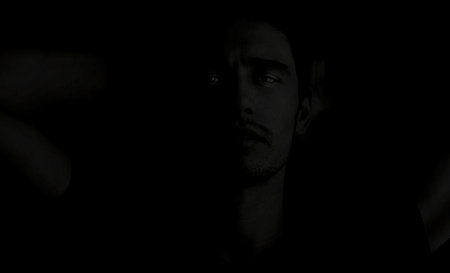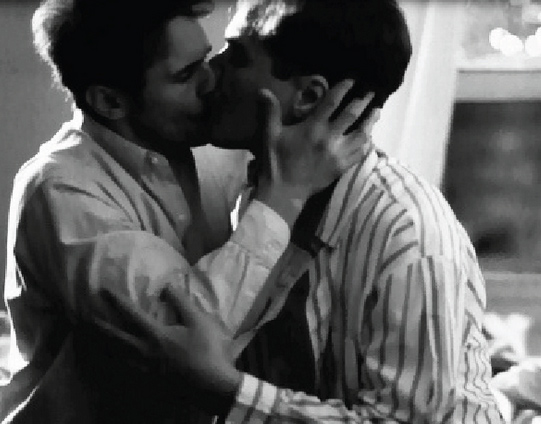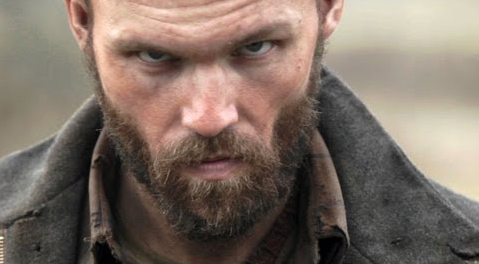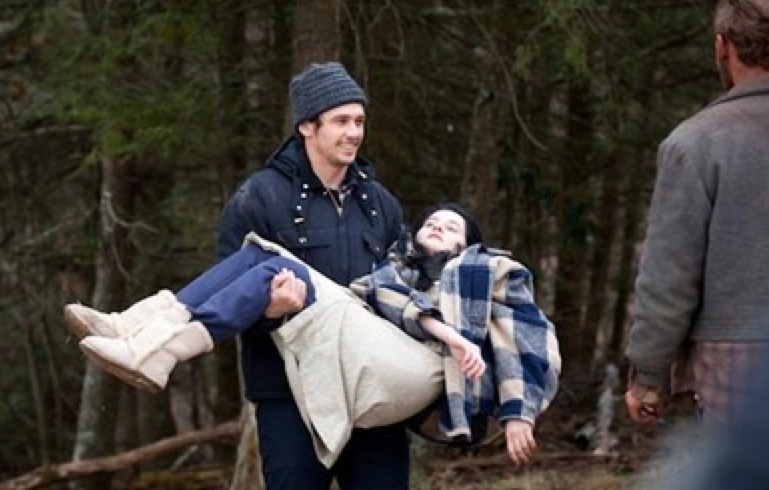James Franco, Disembodied
 Wednesday, September 18, 2013 at 2:00PM
Wednesday, September 18, 2013 at 2:00PM TFE's coverage of the 51st New York Film Festival (Sept 27-Oct 14) begins now. Here's JA on James Franco's press conference for Child of God...

He came at us as a disembodied voice, booming across the auditorium. There was no face to behold - only his words. His Word? Was it the voice of God? I suppose that depends on your definition. If your definition of God is broad in scope (like, that scope includes all of matter itself) then maybe you find room under the umbrella of godliness for actor slash art-provocateur James Franco. It's really not that big a stretch - he is now the man behind the curtain in Oz, after all. There were no bursting flames or rear projection here, but when you plunk down to watch A James Franco Movie (which I find myself spending an increasing amount of my life doing) the specter of Franco always looms large, even if hes not up on the screen. (Especially if he's not up there on the screen.) It's kind of impossible to watch A James Franco Movie not through Franco-colored glasses. We are all living in James Franco's world... well at least we are when we're looking at it from his perspective.
From our perspective here at the New York Film Festival, where we've just finished screening Child of God, Franco's adaptation of the Cormac McCarthy story about nubile young lady corpses and the hillbilly who loves them, we're just staring at a blank screen. You can follow James Franco on Twitter and Instagram and at Vice.com, but a room full of press people can't seem to Skype with him directly. [MORE]
After a couple of muffled expletives from a stranger's voice and an, "Is this in front of an audience? It is?" from Franco himself, the Skype screen settles on a nondescript corner of what might be a hotel room, half a bed's headboard in frame. When asked if we are going to get to see him, in body if not soul, he replies with only an "Umm." It is way existential.
We march on. As James' voice comes to us from where ever it is it's coming at us from, telling us how he came upon Cormac McCarthy's work (in one of his well-documented college classes, natch) and just what it is about necrophilia that he finds so darned appealing (did you know he also made a short film about necrophilia that starred Michael Shannon? Nevermind whether you were dissecting the pros and cons of necrophilia while you were in college - did your college project star Michael Shannon? I thought not), as James tells us all about where he stands in relation to his upcoming dissertation... well, we all sit and stare up at that small nondescript corner of headboard and we all craft our own stories about what we're not seeing.
 James Franco and Michael Shannon have worked together three times now Is James laying on the bed beyond the scope of his computer's camera, rumpled among the sheets like he so often poses on his Instagram? At one point half of a female face wanders into the frame before snapping away reflexively - who is that? Is she with him? Is she with him with him, or just there in the room with him? If the camera were swung around would there be dozens upon dozens of people in the room, all with him with him, more there with him than there are here at this press screening, all of them suddenly staring back at us, the few, the outnumbered - you're either with James Franco, or you're with with James Franco. Resistance is futile-ish.
James Franco and Michael Shannon have worked together three times now Is James laying on the bed beyond the scope of his computer's camera, rumpled among the sheets like he so often poses on his Instagram? At one point half of a female face wanders into the frame before snapping away reflexively - who is that? Is she with him? Is she with him with him, or just there in the room with him? If the camera were swung around would there be dozens upon dozens of people in the room, all with him with him, more there with him than there are here at this press screening, all of them suddenly staring back at us, the few, the outnumbered - you're either with James Franco, or you're with with James Franco. Resistance is futile-ish.
I don't like the thought of that sudden turn-around, it unsettles me, much like his film has just unsettled me - to have James Franco's lens pointed at you is to be forced into all manner of questionable activities; before I know it I could be wiping up poop with a stick or watching two strange men have sex in front of me. Quelle horreur! And so it's better we turn the lens back towards him, or at least the general vicinity of a headboard where he may be, vicinity-wise. We should be focusing on the subject at hand; the problem is that even in a project so self-contained (it's a fine old-fashioned well-acted story being told up there on the screen, void of any sort of meta winking) with James Franco the fascination is always, "Why does James Franco do the things that James Franco does," and so that's the conversation we have. We listen to James Franco tell us why he did what he did.
I've heard a lot of people talk about this, I've heard people like Spielberg say, when you come across something that interests you or inspires you, maybe you don't know all the reasons at the moment why you want to make it but you don't really need to know. You can explore it through the creative process. So I guess I had that [with Child of God]; I had the hairs tingling on the back of my neck. It was a very dark book, but there was something in there. And after making it and thinking about it what it is, is in addition to the great writing and the unusual character portrait, it was a way to talk about things that I think are universal, this need for a connection with an Other, someone outside of ourselves, the need to love and be loved."
But why dead, James? Why does this "Other," this "Not James Franco," keep needing to be a dead thing, an empty receptacle, a featureless wall with a hint of headboard, upon which you project yourself?
It's true, there's this weird pattern. In fact early in my writing life at NYU I wrote a short story about a man who works at a morgue and has friendships with all the bodies that come in. So not necrophilia, but somebody communing with the dead. In my personal life I'm absolutely not attracted to dead people, or anything like that. I think what it is is if you look at some of the other projects I've dealt with I do deal with characters who are isolated and/or have a rich imaginative life.
And so, in the case of Hart Crane [who Franco played in his own film Broken Tower] there's a writer who was isolated - his work didn't fit with the modernist writers of the day. And so he lived in his imagination; in his case you could see it blooming into poetry.
 Scott Haze as "Lester" in Child of God
Scott Haze as "Lester" in Child of God
I kind of view [Child of God's protagonist] Lester in the same way - not that he's an artist, but he's a stand-in for someone who's able to fit into civilized society but he wants a connection with someone else so badly that when he stumbles upon this opportunity, he figures out he can have a relationship with someone outside of him if he animates it with his imagination. I guess for me necrophilia's an extreme way to talk about things that we all want. A connection with another. It's an extreme way to show someone living in their own imaginary world. I guess to quote some people from my literary education, make the unfamiliar familiar. Humbert Humbert is a monster on the outside, but his deep for Lolita is the same love that people in a relationship we condone would have. You're not condoning necrophilia - it's just an extreme way to show universal feelings."
But what are you teaching us, James Franco? What is your lesson plan for today?
"This isn't a film that will guide you to be a better person. It's not that kind of movie. What I think it does that's relevant is it shows okay, here's a person that can't function in civilized society. He's pushed further and further away from civilization. That's relevant today to how we socialize - the main ways of communication are so bound up in technology that the way we socialize is intertwined with learning technological languages and social networking languages... maybe people just give up, that don't want to do that, or engage with that... The point isn't to say if you don't tweet or don't use Facebook you're going to become a killer or sleep with dead bodies. But it's an extreme portrait of somebody on The Outside."
But what if we use Skype, and then the Skype doesn't work, and all we're doing is staring at the corner of a bed in a distant hotel room? Will that turn us into a killer or make us sleep with dead bodies? Nobody asked that follow-up - the interview moved on to what James Franco has left to do in grad school. But I couldn't help but wonder, in my best Carrie Bradshaw voice-over voice, if I walked out of the theater and turned on my iPhone and immediately stopped following James Franco on Instagram, would the Earth itself open up and swallow me whole?




Reader Comments (6)
This is a great piece. And one of the first to truly capture the absurdity of what Franco's up to. (Especially since those of us who aren't at film festivals haven't been able to experience the films firsthand, mostly.)
I have totally lost interest in him...
Jake D -- isn't it just. Jason is such a great voice on the internet. He does not get enough praise/adulation
i was there also and it was... strange. Like, we joked that maybe it was a new James Franco performance art piece. Maybe it was. Maybe he had bed hair and didn't want to talk. Maybe he's actually clueless about how Skype works. It was like machines had gone sentient.
Didn't help that the movie was mostly kinda crap.
Don't do this often (the adulation thing), but it's true that JA makes writing look easy and effortless and it's not.
I've been lax about checking the comments here and I show up and it's all this fuzzy warm and humbling love-fest up in here - thanks for the beyond kind words, you guys. Really. You've given me juice to keep rambling slash foaming at the mouth about whatever nonsense tickles me fancy for months! :)